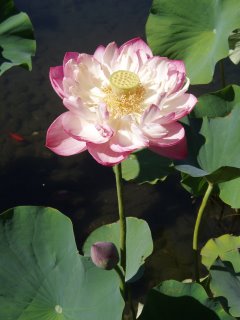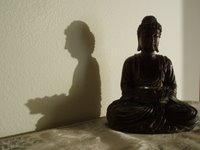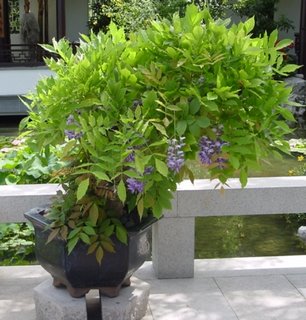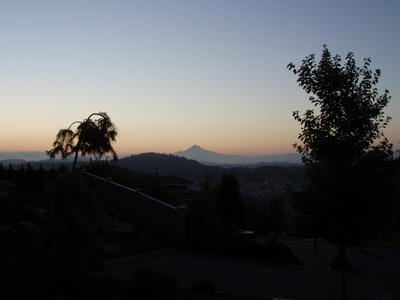An online acquaintance contacted me for my perspective on something. We talked about what was going on with him and once we'd discussed his dilemma, he asked:
"So life has been hectic for you this past week--you get it all resolved?"
"Does one ever resolve life?" I responded.
"Your question intriques me. Is it possible for a person to resolve life if they isolate themselves from society and all influences?"
"I think that is the wrong approach"
"What is the approach?"
And the answer to his question pulled from somewhere deep inside me. I didn't think about it. It was like something in me was waiting for that question to be asked.
"One resolves the ambivalence of life by ceasing to attempt to impose expectations on the present in order to influence the future."
His next question showed that he was misunderstanding me. "So just exist? For me to take that approach in life--would be death--not to have expectations which I equate with having goals - direction or path in life. So with that I guess I really don't want resolve my life. Or am I missing your point?"
The past few months of living sort of gelled and this moment of clarity illuminated me. I felt like I was glowing, like I was a beacon of metta. I had this sensation of overflowing with love and gratitude and compassion.
I said, "We put the past into the future. We carry it around and our expectations create a future based on our pasts. And by 'expectations' I dont mean goals and what not.
I'll use an example to illustrate what I mean... Lets say you call you mother, and it seems that every time you call your mother, she says 'so when are you getting married' and it annoys you. So you avoid calling her, because you KNOW that she will just ask you when you are getting married. And when you do call her or talk to her, you already have expectations of what she is going to say, and you already know how you are going to react. So you aren't really being fully present to the moment...you're clinging to expectations of what will occur in the future--carrying unresolved issues from the past forward. And thus the phone call goes more or less as you expected."
He is a quick one. "This I understand. My body and mind are ready for the question--I am ready to pounce back--I should make the call for the right reason and and approach with an open mind and allow the moment to create itself. In speech communication we talk about not allowing outside influences - verbal, auditory, past experiences etc to interfere with the moment--to shut it all out--exist in the moment--so If I understand your approach in life--you have learned to do that in your life more than most --and thus why you are so clued into all that is going on around you."
I wasn't sure if he was trying to flatter me, or if he was being genuine, but I responded to his words at face-value. "I still do it. Its not a matter of tuning it all out. It is a matter of accepting it all, and then none of it clamours for attention."
"Ok understood," he said.
And then we embarked on a conversation about various topics that eventually lead to me saying that lately I've been finding it a challenge to communicate with others lately, and how it bothers me.
Eventually he said, "Is that what bothers you--that people fail to understand why you respond the way you do--that they can't understand your belief system?"
I tried to think to the best way to explain. "I dont care about being understood, in general. I dont feel misunderstood, I dont feel a need to be understood. But when someone asks me a question, and I give them my best answer, they sometimes look at me like I have three heads. Like the question and answer session about 'can you ever resolve life', but worse. I've responded to others to relinquish expectations of the future, and most people dont get it. Really dont get it, that we drag the past, kicking and screaming, into our futures."
He answered, "I understand what you are saying: let go of your past so you can move on in you life. It is difficult for most people to let go of the past--right?"
I knew he was missing something, a nuance, something I'd been working out the past couple of years. "Its funny--when we think about letting go of the past...we think about discarding it. Wadding it up and throwing it away. But really, uts about not clinging to it. Letting the death grip of fear go, and accepting the past--all of it. And then it is where it belongs.. in the continuity of the moment."
"Yes, but there is a difference between not forgetting, and allowing the past to influence. There is a distinct difference..."
He was close, but he wasn't getting my meaning. So I decided to use an example again. "Did you read about that dream I had, the one about being hit over the head while I was travlling, and panicking about my suitcase being empty, and how it seemed so important to be able to prove who I was?"
"I did."
"My analysis of the dream is that I have anxiety...Over the past two years I've emptied the emotional baggage, but I'm still towing the empty suitcase along... because w/o the baggage, I am afraid I won't know who I am. My ID, Everthing that made me 'me', everything that I identified myself with--was in my baggage. And so I am anxious to figure out--to prove--who I am."
He said, "Well - you are the sum,of your past. But today and tomorrow can add / change who you are. Letting go of the past does not mean giving up your ID."
"I am a vessel. Emptied and filled continually... what happens changes me, but does not become me. I am the container, not what is in it. Does that make sense? And one day, perhaps, I will release the container too :) Perhaps that day I will be enlightened?"
"So you don't believe what happens to you today--that in 2 yrs when you look back--is not a part of your new id?"
"What happens changes me, but does not become me. I can feel fear, anxiety, joy, pain. Do they become a part of me? Or do they effect me? And don't I have the ability to decide how much?"
"Why can't they be both?"
"I never used to feel afraid. I used to BE afraid. As a child I was convinced of the inappropriateness of my emotions, so I ceased expressing or feeling them... I pushed them down, deep down... and they became a part of me in ways they were not meant to be."
"If I remember correctly -- enlightment is what buddhism strives for."
"No. The end of suffering. Release from the wheel of suffering."
"Mmm... ok. Now here is something I have observed in life. Very talented writers, producers, muscians - artsy people - all have unusual suffering in light but give us positive views on a number of subjects in life. Life without suffering is less interesting. Jesus had to endure suffering -- so we know he was not a buddhist."
"Ah, but there are some compelling argumnnts for the idea that for the period of Jesus life of which there is no record--that he disappeared into Asia, and came into contact with Buddhists. Jesus, out of love, suffered for the sins of all mankind. His sacrifice was supposed to release his followers from suffering. They were supposed to be assumed into heaven during their lifetimes. They were supposed to become enlightened."
"Well it didn't work did it?"
"Apparently did not."
"I can't wait to talk to my dad about Jesus converting to Buddism," he laughed.
"I think that... Well...it is blasphemy to some, but I think the Rapture is a figurative expression of what it is to become 'enlightened'. I think that the imagery for early Christian texts, the attempts of the writers to give people something concrete to imagine what enlightenment was like... have been taken too literally. The inducement to give up one's clinging to pain and fear and suffering and 'sin' by one person's suffering for all...was apparently not enough.
Jesus said: This is my commandment, that you love one another. And love/lovingkindness/metta is the foundation of what Buddha taught. Loving yourself, loving your neighbor, your family, and your enemies... this is part of metta meditations. 'Love thy enemy as thy self' is so very buddhist."
"There are basic commonalities in most religions."
"It is amazing...How it all fits together... all the religious teachings. You are correct. They all say the same thing: Let go of your pain, your fear, your hatred, your 'sins', and love instead, and send it out into the world, and you will be set free--you will find the way to heaven / nirvana / paradise."
"Yes it is, and yet we can't seem to get along."
"I think the judeo-christian-islamic 'sin' is actually 'holding on to negatively charged past experiences.'"
"Interesting observation."
"The catholics tried to make it easier for people to let go by 'absolving them'--by giving them a ritual by which they could release their sins / regrets / pains... but it all got twisted. Eventually, you had to buy absolution. One way or another, you had to pay. It is all so very clear to me. I've considered posting some of this on my blog, but I'm worried someone would track me down and burn me for being a heretic :) The fundamentalist movements in all faiths create such zealots."
"You are a female -- witch burning in Oregon will pass."
"I'm only 30 minutes from Salem :)"
"Yes and now killing is ok to defend your beliefs."
"The world is crazy. But what is crazier is that every day it becomes clearer and cleared what the insanity is. And it is too simple, and people would not listen."
"So - simply put you would recommend?"
"The insanity is fear of the uncertainty of everyday life. The solution is accepting that uncertainty, and loving every moment you have.
And it is fear of death, dying, going broke, loss... Fear of loss. Fear of the unknown. That is why we project the past into the future... why we drag it along with us. Because it is familiar. We know we can survive what we have experienced before."
"Fear keeps us stuck."
"You have come along tonite for me at a perfect time... to help me put into words what I have come to understand intuitively but felt unable to express coherently."
"So you better understand yourself?
"Its not about understanding myself. There is nothing to understand :) The bags are empty."
"Sure they are "
"Right now, in this moment, they are."
"Got it - :-)"
"5 minutes from now, tomorrow morning, it may be different. God, I sound like..."
"Your grandparents?"
"Such a... such a smug ass."
"Nah--I understand and relate to what you say."
"Good to hear. Maybe others will."
Labels: buddhism, christianity, compassion, conversation, dreams, expectations, fear, future, jesus, life, metta, morning, past, philosophy, present, religion, suffering, uncertainty























